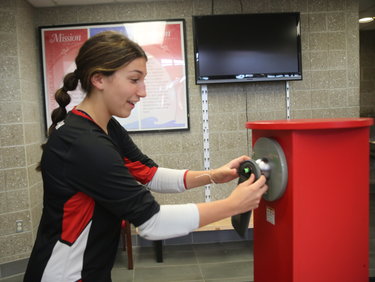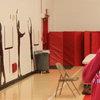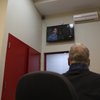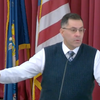On cell-phone ban: ‘You kind of have to talk to people now’
GUILDERLAND — Two new state requirements were at play during the September school board meeting here: The board’s new student representative, senior Paarth Sarecha, had some recommendations on the bell-to-bell ban on smartphones.
Governor Kathy Hochul had pushed for the ban, starting her statewide “listening tour” in Guilderland last year and later, in January, launching at Farnsworth Middle School her successful campaign to implement the ban.
Her report, “More Learning, Less Scrolling: Creating Distraction-Free Schools,” on the findings from her listening tour said that safety is not compromised by smartphone bans and that the bans improve mental health.
Other new legislation this school year requires every school district with a high school to include at least one ex officio, non-voting student on their boards. Formerly, this was allowed but not required.
“This legislation will ensure that students have a seat at the table where decisions that shape their educational opportunities and experience are made and that members of the board hear and benefit from their insights as students,” said Senator Shelley Mayer, who sponsored the bill, when it was signed into law.
Sarecha is familiar with the school board. He served as a student representative last year and this year, too. He also successfully petitioned the board to have the Hindu holiday Diwali made into a school holiday.
In his role as student representative, Sarecha brought a Yondr pouch to the Sept. 9 meeting “to Vanna White it,” he said, as he demonstrated how the pouches, purchased by the district, allow students to lock away their phones during the school day while still possessing them.
“They’re not allowed to unlock them until the end of the day,” he said. “So there’s multiple unlocking stations throughout the building.”
He also said, “It’s not a really, really big holdup to students.”
Later in the two-hour meeting, Sarecha raised an issue with the ban that had been brought to his attention by art students.
“The way these students kind of go through their classes is they take pictures of their art all throughout the process,” he said, adding, “Multiple students came up to me, asking for help.”
An art teacher explained to Sarecha that pictures of the students’ art in advanced classes are sent to the College Board for assessment.
Sarecha went on, “So they’re either resorting to really, really old digital cameras that they’re bringing in, which definitely aren’t capturing the great quality or they have to use their Chromebooks … Chromebook cameras are really, really bad. They’re completely dark.”
“Does Governor Hochul even allow us to make this kind of adjustment?” asked the school board’s president, Blanca Gonzalez-Parker. “Is there that flexibility?”
“I think we just have to work out the solution internally,” said Superintendent Daniel Mayberry.
Board member Peter Stapleton said Watertown High School in Massachusetts is piloting an app that allows students to “sign in and out in particular classrooms.”
“We’re in a period of transition right now ….,” said Michael Pisctelli, the principal of Guilderland High School. “The one thing we have to be cautious of is not to have a knee-jerk reaction to every request that comes in and says, I need to use the phone, because once we start opening up that can of worms, it’s very hard to put the genie back in the bottle.”
No one suggested having the art teachers use their phones to take the needed pictures of student artwork.
“Since now that we don’t have phones, is it possible to unblock YouTube on the Chromebooks again?” asked Sarecha.
“It is not,” responded Rachel Anderson, assistant superintendent for curriculum and instruction, “because there are state laws regarding student privacy and security that we have to abide by. And YouTube is not one of the apps that will sign that for us.”
Mayberry concurred, “Yes, it’s New York State law and they’re not willing to do that.”
At the end of the meeting, Gonzalez-Parker said, “I think I’ve been the most vocal on the board about my concerns about the cell-phone ban policy.”
Board member Meredith Brière interjected, with a laugh, “I don’t think that’s true.”
Gonzalez-Parker went on to say she had talked to students, “And, in general, they have been fine with it socially which was my biggest concern … so that blew my mind.”
She concluded, “I just wanted to share that publicly because that was great to hear. And so I was wrong, apparently, with that.”
Sarecha concurred. He said a lot of things had been put in place to engage students socially, like a foosball table in the cafeteria and cornhole games outside, “which my friends and I play almost every day.”
He said of the Yondr pouches, “People have said they haven’t been as bad as they thought they were. It’s kind of encouraging socialization among a lot of people because like, you kind of have to talk to people now. And it’s been really nice to see.”
Gonzalez-Parker said she had surveyed two dozen students on the issue. “Not a single one of them, in terms of the socialization piece, reported anything negative. One student, she said, “told me all about how they had a long discussion about the varieties of apples in New York. So, I don’t think that would have happened last year. So I just want to put that out there as a positive.”
“How do you like those apples?” asked board member Nina Kaplan, with a smile. Kaplan had been a strong proponent of the ban.
Stapleton said the next thing to consider, in terms of brain development, is the use of Chromebooks in the elementary schools.
He suggested looking into how much time young students spend on their Chromebooks and how necessary they are.
“I think there’s more to come,” he said.
“I’m not sure I can handle that this evening,” said Gonzalez-Parker before the meeting was adjourned.



